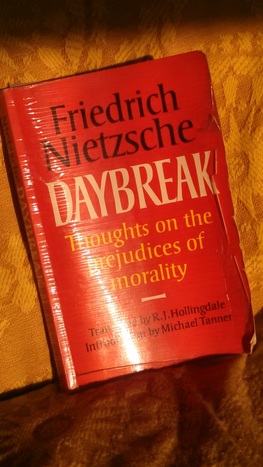 2020 Nietzsche Daybreak
2020 Nietzsche Daybreak Dream food hunger
Chance drives, awake and asleep, as felt text of nervous stimuli active as nourishment for a physiological process unknown to us.
Sentence 11 has a “his” changed to their:
8.
Perhaps this cruelty perpetrated by chance would be more vividly evident if all the drives were as much in earnest as is hunger, which is not content with dream food; but most of the drives, especially the so-called moral ones, do precisely this – if my supposition is allowed that the meaning and value of our dreams is precisely to compensate to some extent for the chance absence of ‘nourishment’ during the day.
9.
Why was the dream of yesterday full of tenderness and tears, that of the day before yesterday humorous and exuberant, an earlier dream adventurous and involved in a continuous gloomy searching?
10.
Why do I in this dream enjoy indescribable beauties of music, why do I in another soar and fly with the joy of an eagle up to distant mountain peaks?
11.
These inventions, which give scope and discharge to our drives to tenderness or humorousness or adventurousness or to our desire for music and mountains – and everyone will have their own more striking examples to hand – are interpretations of nervous stimuli we receive while we are asleep, very free, very arbitrary interpretations of the motions of the blood and intestines, of the pressure of the arm and the bedclothes, of the sounds made by church bells, weather-cocks, night-revellers and other things of the kind.
12.
That this text, which is in general much the same on one night as on another, is commented on in such varying ways, that the inventive reasoning faculty imagines today a cause for the nervous stimuli so very different from the cause it imagined yesterday, though the stimuli are the same: the explanation of this is that today’s prompter of the reasoning faculty was different from yesterday’s – a different drive wanted to gratify itself, to be active, to exercise itself, to refresh itself, to discharge itself – today this drive was at high flood, yesterday it was a different drive that was in that condition.
13.
– Waking life does not have this freedom of interpretation possessed by the life of dreams, it is less inventive and unbridled – but do I have to add that when we are awake our drives likewise do nothing but interpret nervous stimuli and, according to their requirements, posit their ‘causes’? that there is no essential difference between waking and dreaming? that when we compare very different stages of culture we even find that freedom of waking interpretation in the one is in no way inferior to the freedom exercised in the other while dreaming? that our moral judgments and evaluations too are only images and fantasies based on a physiological process unknown to us, a kind of acquired language for designating certain nervous stimuli? that all our so-called consciousness is a more or less fantastic commentary on an unknown, perhaps unknowable, but felt text?
*Next Up: Tomorrow, 20 April, and the first part of 2020 Nietzsche Daybreak aphorism 119.
Posted by Bryan W. Brickner
 RSS Feed
RSS Feed
